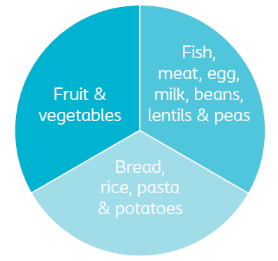Eating healthily is especially important for people dealing with bowel dysfunction. In addition to helping you maintain a healthy weight and making a positive impact to your overall health and well being, a well-balanced diet can improve the consistency of your stool to help ease evacuation and keep your bowel movements more regular. Stool consistency has a positive impact on the ability of your Peristeen® Plus irrigations to clear out as much stool as possible with each irrigation.
The following dietary information is provided for general guidance. Always seek guidance from your healthcare provider before making any dietary changes.
Basic principles

Aim for a well balanced diet
A balanced diet is one that includes portions from all the main food groups, so your body gets the nutrients it needs to function correctly. Nutrition is complex, and an understanding of what represents a ‘healthy’ diet is constantly evolving. That said, these core principles can help you establish a good foundation and get proper nutrition from your diet:
FRUITS AND VEGETABLES
Try to eat at least five portions a day. Consider apples, apricots, avocados, pears and leafy greens.
BREADS AND CEREALS
Focus on high-fiber breads, flax seed and cereals comprised of whole grains.
MILK AND DAIRY PRODUCTS
Opt for high-calcium products that are low-fat and have little or no added salt or sugar such as cottage cheese and low-fat milk. Also look for yogurts or drinks with probiotics to promote gut health.
MEAT, POULTRY, EGGS AND FISH
Choose options with less saturated fat, like poultry and other white meat, and eat fish at least twice a week. Limit red meat options.
FATS AND OILS
Use vegetable oils for cooking (olive, rapeseed, sunflower) instead of butter.
FIBER AND FLUIDS
A fiber-rich diet and good hydration can help your bowel movements.
SUGAR
Limit consumption of sweets and avoid added sugar in prepared foods, desserts and drinks. Look for sugar-free beverage alternatives like sparkling waters or unsweetened teas or coffees.
Bernardi M, Fedullo AL, Bernardi E, Munzi D, Peluso I, Myers J, Lista FR, Sciarra
T. Diet in neurogenic bowel management: A viewpoint on spinal cord injury. World J
Gastroenterol 2020; 26(20): 2479-2497
Information from Coloplast Care is for educational purposes only. It is not intended to substitute for professional medical advice and should not be interpreted to contain treatment recommendations. You should rely on the healthcare professional who knows your individual history for personal medical advice and diagnosis.


